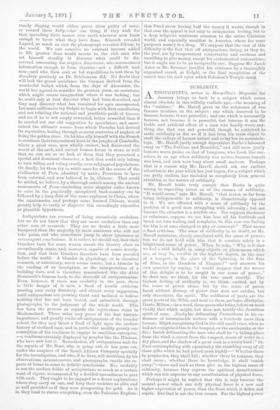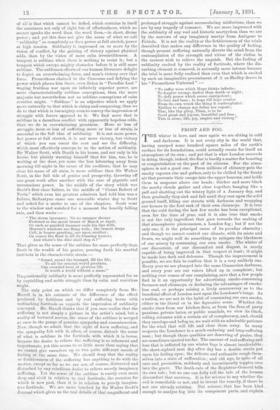SUBLIMITY.
ATHOUGHTFUL writer in Macmillan's Magazine for January brings us back to a subject which seems almost obsolete in this wilfully realistic age,—the meaning of the "sublime." Mr. Haven gives us the substance of two, famous treatises on the subject : one which deserved to be famous, because it was powerful ; and one which is necessarily famous, not because it is powerful, but because it was the feeble and artificial effort of a man who hardly wrote any- thing else that was not powerful, though he contrived to. make sublimity as fiat as if it had been his main object to exalt the valleys of human nature and to lay low its mountain- tops. Mr. Haven justly enough depreciates Burke's laboured essay on "The Sublime and Beautiful," and still more justly bestows warm praise on that of Longinus, who lived, like our- selves, in an age when sublimity was scarce, because tumult was loud, and men were busy about small matters. Perhaps that is a reason why Mr. Havell should ask our earliest attention in the year which has just begun, for a subject which our petty realism has excluded so completely from general attention as the nature of sublimity.
Mr. Havell holds truly enough that Burke is quite wrong in regarding terror as of the essence of sublimity.. "It would seem," says Mr. Haven, "that terror, so far from being indispensable to sublimity, is diametrically opposed to it. We are affected with a sense of sublimity by the position of a good man struggling with adversity ; but not because the situation is a terrible one. For suppose the terror to culminate, suppose we see him lose all his fortitude and break out into wailing and complaint, in this case our feeling for him is at once changed to pity or contempt." That seems a final criticism. The sense of sublimity is, no doubt, as Mr. Havell maintains, closely associated with the sense of power ; but we do not hold with him that it consists solely in a heightened sense of power. When he asks, "Why is it that we feel a wild delight in many objects or phenomena which are, or may be, terrible in the highest degree, in the roar of a tempest, in the glare of the lightning, in the fires of Etna, in the thunders of Niagara ?" and answers his own question by saying, "I would suggest that the source. of that delight is to be sought in our sense of power;' he does not, we think, hit the true mark exactly. The highest feeling of sublimity is, we think, excited, not by the sense of power alone, but by the sense of power faced without dismay, of power that does not subdue, but only stimulates, the spirit. The sublimest of poets are the great poets of the Bible, and next to them, perhaps, 2Eschylus, Dante, Milton,—in a word, those poets who bring before us most vividly that which 'might, but does not, terrify the dauntless spirit of man. Aschylus delineating Prometheus in his en- durance of interminable torture with a fortitude more than human; Elijah recognising God in the still small voice, when he had not recognised him in the tempest, or the earthquake, or the fire ; Isaiah delineating the man who shall be "a hiding-place from the wind, a covert from the tempest, rivers of water in a dry place, and the shadow of a great rock in a weary land ;" St. Paul contemplating with equanimity the vanishing away of all those gifts which he had prized most highly—" Whether there- be prophecies, they shall fail ; whether there be tongues, they shall cease ; whether there be knowledge, it shall vanish away,"—these and such as these give us the highest sense of sublimity, because they express the spiritual dauntlessnessi which can rise superior to any manifestation of physical force..
Perhaps it might be replied that this is only because the mental power which can defy physical force is a new a.ncl higher expression of power, than the force which it defies and reels. But that is not the true reason. For the highest power
of all is that which cannot be defied, which contains in itself the assurance not only of right but of effectualness, which no sooner speaks the word than the word lives,—in short, divine power ; and yet this does not give the sense of what we call " sublimity" so completely as does power at full stretch, power
at high tension. Sublimity is impressed on us more by the vision of conflict, by the gaining of victory against physical odds, than by the vision of mere calm irresistibleness. A tempest is sublime when there is nothing to resist it; but a tempest which sweeps mighty obstacles before it is still more sublime. The sublimest efforts of our human literature delight to depict an overwhelming force, and man's victory over that force. Prometheus chained to the Caucasus and defying the power which places him there, even Satan in "Paradise Lost" waging fruitless war upon an infinitely superior power, are more characteristically sublime conceptions, than the more majestic but nevertheless not so sublime conceptions of calm -creative might. " Sublime " is an adjective which we apply more naturally to that which is rising and conquering, than we do to that which is too mighty even to convey the impression of struggle with forces opposed to it. We find more that is sublime in a dauntless conflict with apparently hopeless odds, -than we do in overwhelming greatness. More or less of struggle, more or less of suffering, more or less of strain, is essential to the full idea of sublimity. It is not mere power, but power at full stretch, it is not mere victory, but victory of which you can count the coat and see the difficulty, which most effectively conveys to us the notion of sublimity. Sir Walter Scott, with Death in his house, and not only in his house, but plainly warning himself that for him, too, he is waiting at the door, yet none the less labouring away from morning till night in the cause of his creditors, that he may .clear his name of all stain, is more sublime than Sir Walter Scott, in the full tide of genius and prosperity, throwing off one great work after another with the ease of gigantic and unconscious power. Li the middle of the story which was Scott's &et clear failure, in the middle of "Count Robert of Paris," which even his greatest admirers had told him was a failure, Ballantyne came one miserable winter day to Scott and asked for a motto to one of the. chapters. Scott went
• to the window and watched for a moment the heavily falling rain, and then wrote :—
" The storm increases ; 'tis no summer shower
Fostered in the moist breast of March or April, Or such as parchbd Summer cools his lips with. Heaven's windows are flung wide ; the inmost deeps Call, in hoarse greeting, one upon another ; On comes the flood in all its foaming horrors, And where's the dike shall stop it P" 'That gives us the sense of the sublime far more perfectly than Scott in the wealth of his genius, pouring forth his martial instincts in the characteristic strain :—
" Sound, sound the trumpet, fill the fife,
To all the sensual world proclaim, One crowded hour of glorious life
Is worth a world without a name."
Unquestionably sublimity is more perfectly represented for us by unyielding and noble struggle than by calm and resistless might.
The only point on which we differ completely from Mr.
Havell is in his estimate of the difference of the effect produced by fictitious and by real suffering borne with unflinching fortitude as regards the impression of sublimity conveyed. Mr. Havell thinks that if you once realise that the suffering is not simply a picture in the artist's mind, but a reality of tortured nerves, the sense of the sublime is merged at once in the pangs of genuine sympathy and commiseration. Now, though we admit that the sight of keen suffering, and the sympathy felt with it, often, of course, disturb the sense of what is sublime in the fortitude with which it is borne, because the desire to relieve the suffering is so vehement and importunate, yet this seems to us little more than saying that we cannot give ourselves up to two quite different moods of feeling at the same time. We should deny that the reality or fictitiousness of the suffering has anything to do with the matter, except so far as we are not, of course, distracted and disturbed by any rebellious desire to relieve merely imaginary suffering. Yet the sense of the sublime is surely even more deep and vivid in relation to real fortitude, the occasion for which is now past, than it is in relation to purely imagina- tive fortitude. We are more touched by Sir Walter Scott's Journal which gives us the real details of that magnificent and prolonged struggle against accumulating misfortune, than we are by any tragedy of romance. We are more impressed with the sublimity of any real and historic martyrdom than we are by the sorrows of any imaginary martyr from Antigone to Fabiola. It is not the reality or the fictitiousness of the trials described that makes any difference in the quality of feeling, though present suffering naturally diverts the mind from the contemplation of the strength and virtue of the victim to the earnest wish to relieve the anguish. But the feeling of sublimity excited by the reality of fortitude, where the dis- turbing element is removed, is naturally more intense because the trial is more fully realised than even that which is excited by such an imaginative presentment of it as Shelley draws in his "Prometheus Unbound" ;—
"To suffer woes which Hope thinks infinite ; To forgive wrongs darker than death or night ; To defy power which seems omnipotent ; To love and bear ; to hope till hope creates From its own wreck the thing it contemplated; Neither to change nor falter nor repent ; This, like thy glory, Titan, is to be
Good great and joyous, beautiful and free; This is alone, life, joy, empire and victory."















































 Previous page
Previous page